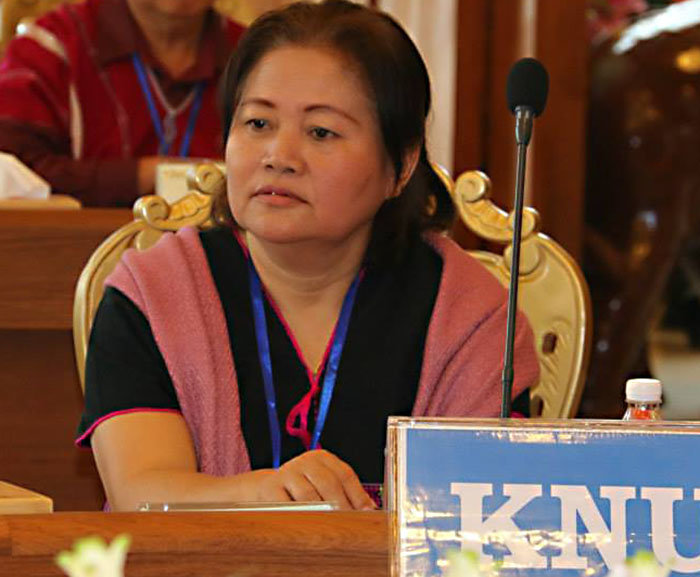Following a recent summit at Karen National Union headquarters in Law Khee La, ethnic armed organisation leaders agreed on 15 amendments to the draft-text of a nationwide ceasefire agreement (NCA) agreed between ethnic and government negotiators on 31 March.
A 15-member committee was also appointed, tasked with negotiating these amendments with the government’s Union Peace-Making Work Committee.
DVB spoke to the Karen National Union’s Vice President Zipporah Sein, appointed leader of the newly-formed team, to find out more.
Q: We understand that you have been appointed as the chair of a negotiation team – what is the mandate of this body?
A: We are to continue negotiation [with the government] on the NCA amendments decided at the Law Khee La summit.
Q: At the summit it was concluded that the NCA should be signed by all ethnic armed groups, yet the government is saying the Kokang, Ta-ang and Arakanese groups should not be included. What is the first step for your team to resolve this?
A: The government may have a policy not to include certain groups in the NCA, but our stance of all-inclusiveness is based on a policy we adopted at the first Law Khee La summit in January 2014. We believe that if all existing armed groups are not included, then at least all NCCT members should be part of the deal.
Q: How much of a role do you think women and activists will be allowed?
A: Everyone agreed that they should all participate in the political dialogue and we are considering allowing them to participate as observers in the ongoing negotiation talks.
Q: A representative of the Chinese government attended the talks in Law Khee La while Burma’s opposition leader Daw Aung San Suu Kyi was invited by the Communist Party of China to visit the country. What kind of message would you like to give to Daw Aung San Suu Kyi regarding her visit to China?
A: I think that the important thing is for everyone – not just ethnic groups but also political parties – to work together to bring about genuine peace in the country.
[related]
Q: The government previously said they have no amendments to make to the NCA draft but the ethnic armed groups in the Law Khee La talks have proposed 15 amendments to the draft. Some media have reported that this means the NCCT are trying to bargain. What is your response to this?
A: The armed groups in the past had individually reviewed the NCA draft within their own organisations, but the recent summit in Law Khee La was the first time when everyone sat down together to discuss it, which was a worthwhile process. That was what we had always planned to do.
Q: Do you have any other comments you would like to make regarding the summit?
A: By achieving a nationwide ceasefire, we hope to bring about genuine peace in the country, and in order to make this work we need the Burmese people’s participation. They should tell us what we need to do. We have been engaged in the peace process for three years now, and are working to achieve a substantial ceasefire agreement that will allow us to move ahead with political dialogue.
At this moment, we are yet to reach the stage of political dialogue – we are yet to achieve genuine peace. In order to make that happen, we need concrete political guarantees.



